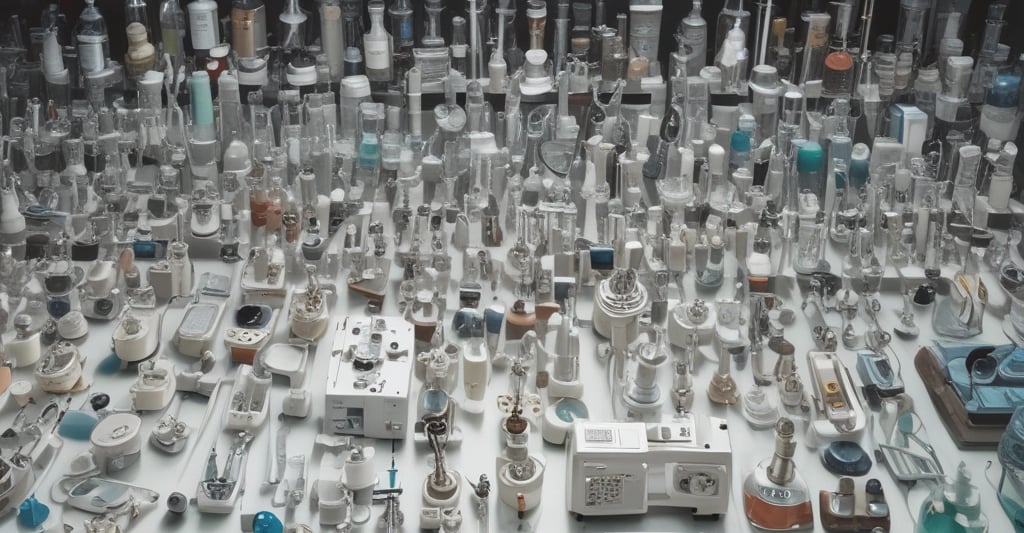Pioneering Innovations in Medical Technology: A History of Medical Advancements
Medical technology has played a crucial role in shaping healthcare throughout history. From early surgical tools to advanced robotic procedures, medical innovations have revolutionized the diagnosis, treatment, and prevention of diseases. This article explores the evolution of medical technology, highlighting key milestones that have transformed the field of medicine.
medtechoptions.com
4/6/20253 min read


Ancient and Medieval Innovations
The history of medical technology dates back to ancient civilizations, where rudimentary medical instruments and practices were developed. The Egyptians, for instance, utilized surgical tools made of bronze and copper, while the Greeks and Romans refined medical practices through empirical observations. The Hippocratic Oath, formulated in ancient Greece, set ethical standards for medical practitioners.
In medieval times, the Islamic Golden Age contributed significantly to medical advancements. Scholars like Al-Zahrawi, known as the "father of surgery," documented surgical techniques and developed specialized instruments. The invention of eyeglasses in the 13th century marked a significant step in vision correction, paving the way for later advancements in ophthalmology.
The Renaissance and Early Modern Period
The Renaissance era (14th–17th century) witnessed a renewed interest in scientific inquiry, leading to groundbreaking medical discoveries. The printing press facilitated the widespread dissemination of medical knowledge, while pioneers such as Andreas Vesalius conducted detailed anatomical studies, enhancing surgical accuracy. The development of the microscope by Antonie van Leeuwenhoek in the 17th century revolutionized microbiology, allowing scientists to observe bacteria and other microorganisms for the first time.
The 18th and 19th centuries saw the advent of vaccines and anesthesia. Edward Jenner’s smallpox vaccine in 1796 marked the beginning of immunology, saving millions of lives. In 1846, William Morton demonstrated the use of ether anesthesia, revolutionizing surgical procedures by eliminating pain during operations.
The 20th Century: A Leap into Modern Medicine
The 20th century was a period of rapid advancements in medical technology, driven by scientific discoveries and industrial progress. The development of X-ray imaging by Wilhelm Roentgen in 1895 allowed for non-invasive internal diagnostics, transforming medical assessments. Soon after, electrocardiograms (ECGs) emerged to monitor heart activity, significantly improving cardiology.
The mid-20th century witnessed the development of antibiotics, such as penicillin, which revolutionized the treatment of bacterial infections. Medical imaging technologies, including ultrasound and computed tomography (CT) scans, enhanced diagnostic precision. The invention of the pacemaker in the 1950s and the first successful organ transplant in 1954 were milestones in life-saving procedures.
The latter half of the 20th century saw significant progress in prosthetics and artificial organs. Dialysis machines provided hope for patients with kidney failure, while the introduction of magnetic resonance imaging (MRI) in the 1970s offered unparalleled insights into soft tissues and neurological disorders.
The 21st Century: The Digital and AI Revolution
The 21st century has witnessed an unprecedented digital transformation in medical technology. Robotics, artificial intelligence (AI), and nanotechnology have redefined healthcare by enhancing precision and efficiency. Robotic-assisted surgeries, such as those performed by the da Vinci Surgical System, have minimized invasiveness and improved surgical outcomes.
AI-powered diagnostic tools, such as machine learning algorithms that detect diseases from medical images, have enhanced early detection and treatment planning. Wearable health devices, such as smartwatches and continuous glucose monitors, allow real-time health monitoring, empowering patients to manage chronic conditions proactively.
Biotechnology has also made remarkable strides, with the development of CRISPR gene-editing technology offering potential cures for genetic disorders. The rapid production of COVID-19 vaccines using mRNA technology in 2020 demonstrated the power of modern medical advancements in responding to global health crises.
The Future of Medical Technology
The future of medical technology promises even more groundbreaking innovations. Advances in personalized medicine, driven by genetic research, are enabling treatments tailored to individual patients. 3D printing technology is being used to create customized prosthetics and even human tissues for transplantation.
Artificial intelligence and big data are poised to further revolutionize healthcare by predicting disease outbreaks and optimizing treatment strategies. Meanwhile, nanotechnology is opening doors to targeted drug delivery systems, minimizing side effects and improving patient outcomes.
Conclusion
The history of medical technology is a testament to human ingenuity and perseverance. From rudimentary surgical tools in ancient civilizations to AI-driven diagnostics in the modern era, medical advancements have continually improved healthcare outcomes. As technology continues to evolve, the future holds the promise of even more transformative discoveries, ensuring better health and longevity for future generations.
